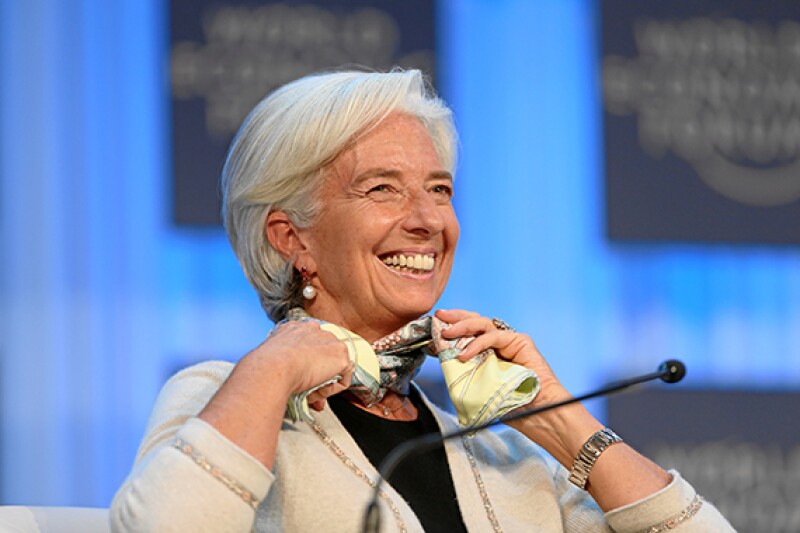
|
Christine Lagarde is a new entry this year |
Christine Lagarde became one of the most powerful people on earth – and a Global Tax 50 regular – when she became head of the International Monetary Fund (IMF) in 2011.
The organisation works to ensure the stability of the international money system and, under Lagarde, its mandate expanded in 2012 to include macroeconomic and financial sector issues. It monitors global economic trends and developments that affect the health of the international monetary and financial system and promotes dialogue among member countries on the regional and global consequences of their policies.
To promote economic stability, the IMF provides technical assistance and advice to countries, as well as offering financial assistance via loans – usually to countries in economic distress. These loans are a key tool for influencing the economic policies and measures that a country implements to improve its financial situation. The lending arrangement between the IMF and debtors usually involves a number of conditions being imposed on the country, which often includes widening the tax net, tax cuts, privatisation of public assets and rises in sales taxes, designed to increase investment into ailing economies while balancing public finances.
Examples of countries that have received assistance from the IMF this year include Pakistan, which Lagarde praised for completing a $6.4 billion IMF programme, but said more work was still necessary. "Despite the marked improvements over the IMF-supported programme, Pakistan still only collects little more than half of what is estimated as a feasible amount in taxes. This means continued efforts are needed to bring more people into the tax net and ensure that all pay their fair share."
The organisation is an important voice in global economic developments and Lagarde has highlighted the role of tax policy within such developments in several speeches over the course of 2016.
In Abu Dhabi, Lagarde said that revenue mobilisation and international taxation are two key ingredients for successful 21st-century economies. The ability of countries to generate robust government revenue is the "lifeblood of modern states", which "allows governments to provide public goods that support strong and durable growth". In addition, international taxation is "an essential means by which governments mobilise their revenues in a globalised economy," Lagarde said. "We need a system that discourages the artificial shifting of profits and assets to low-tax locations. And we need a system that discourages overly aggressive tax competition among countries. In other words, we need a tax system in which ordinary citizens are convinced that multinational companies and wealthy individuals are contributing a fair share to the public purse, to the common good."
In a key speech in January 2016, Lagarde expressed the need for a global policy upgrade. "There is a growing recognition that the short-term nature and inherent volatility of global capital flows are part of the problem affecting emerging economies today," she told her audience in Paris. "There is also an inherent debt bias embedded in the global tax system. More generally, the international monetary system would benefit from a higher share of equity compared with debt flows."
She argued that supervisory frameworks in source countries of capital could be adjusted, and that recipient countries could consider policies to make their financial systems more resilient against capital flows. "Both prudential and tax policies can play a useful role here. For example, the tax system could be structured to provide incentives to rely less on debt and more on direct investment and equity financing," she said.
Tax also got a mention in a Lagarde speech in Washington on November 7, in which she pressed governments to do more to promote equal economic opportunities for men and women, particularly equal pay, which she described as a "an economic no-brainer". In the speech, she advocated advanced economies to ease the tax burden on second earners and single parents – both groups that are typically made up of more women.
Lagarde has not only targeted governments in her efforts to foster change. In October 2016, she called on businesses to work together to build a more inclusive and successful global economy. In their role as leaders, businesses need to rebuild trust to stamp out tax evasion. "Even a casual observer of the Panama and Bahamas Papers revelation can see that efforts to avoid tax not only erode trust, but also short-change society," she told the Conference on Inclusive Capitalism in New York.
"There are no reliable estimates of the amount of tax revenue foregone through accounts detailed in the Panama Papers — both legally through sophisticated planning and illegally through tax evasion. These revelations, however, clearly show that there is a great deal of both. The resulting revenue losses represent a missed opportunity for society — and for pro-growth investments like education, health, and the environment. An efficient and fair tax system is an essential part of the circle of reinvestment."
However, outside of her role at the IMF, Lagarde is facing her own trust dilemma. She stood trial in France on December 12 as part of a long-running fraud case. She is accused of giving preferential treatment to business tycoon and French politician Bernard Tapie when she was the French finance minister under Nicolas Sarkozy. She denies any wrongdoing and the case continues.
The Global Tax 50 2016 |
|
|---|---|
The top 10 • Ranked in order of influence |
|
2. The International Consortium of Investigative Journalists |
|
3. Brexit |
4. Arun Jaitley |
5. Jacob Lew |
|
10. Donald Trump |
|
The remaining 40 • In alphabetic order |
|









